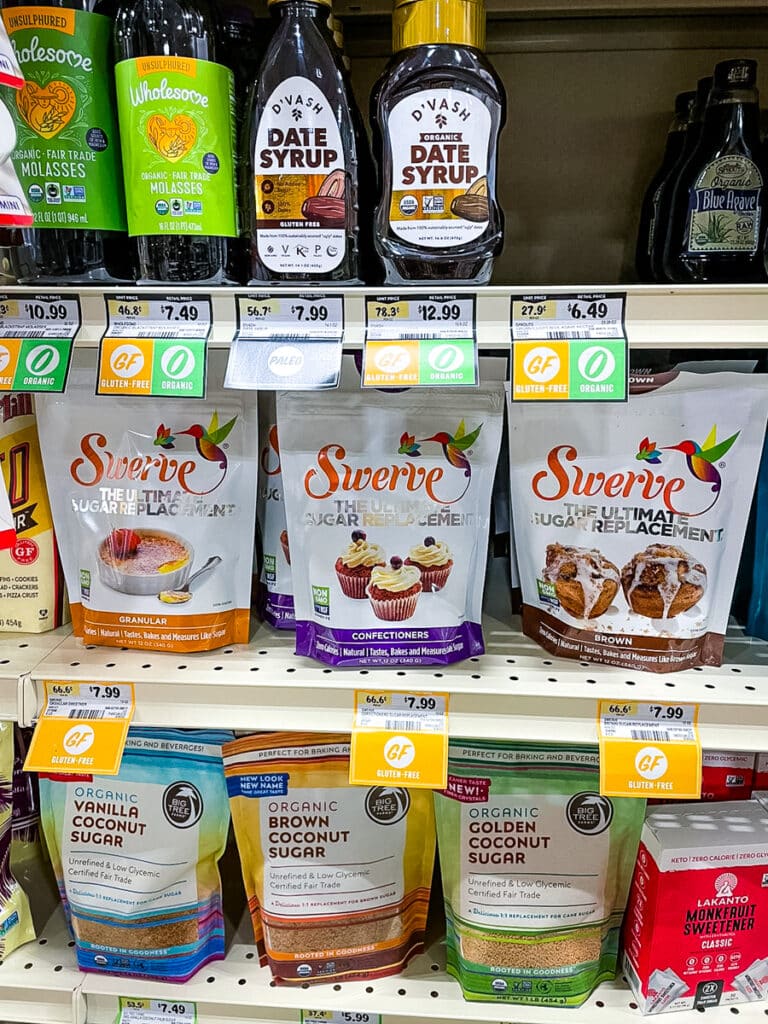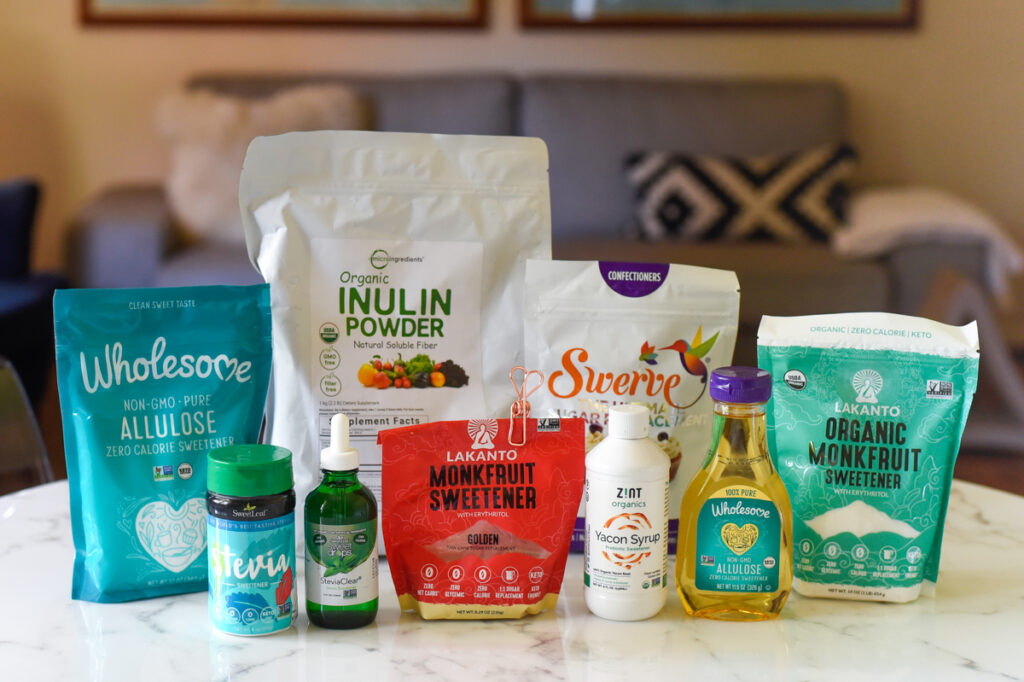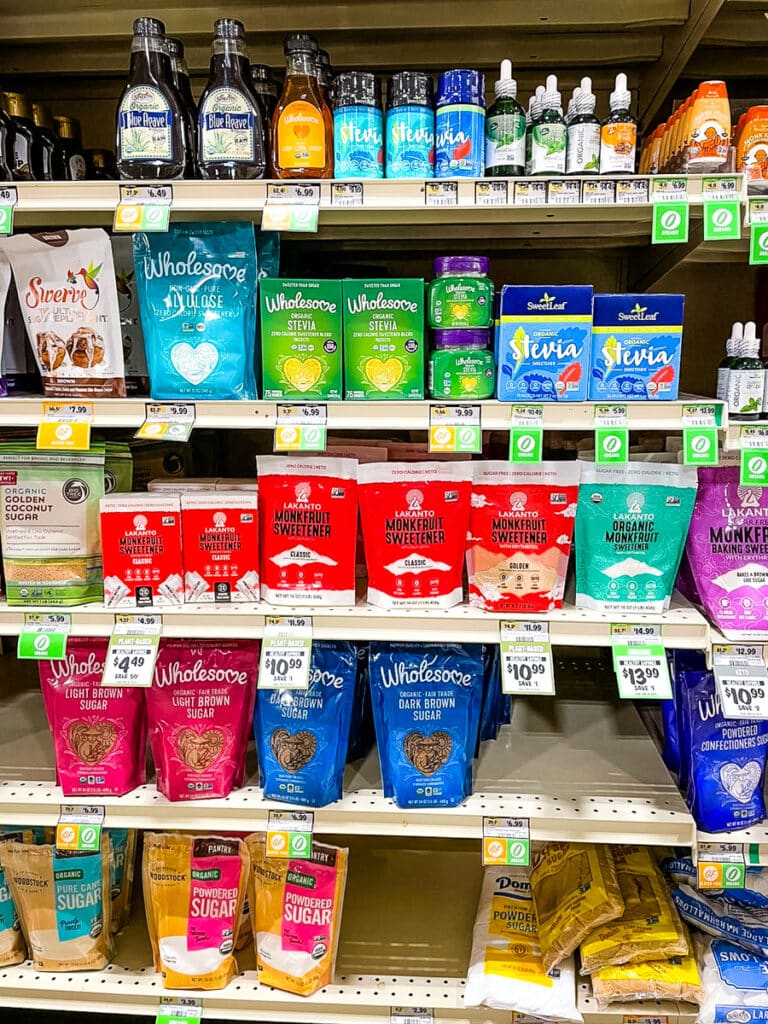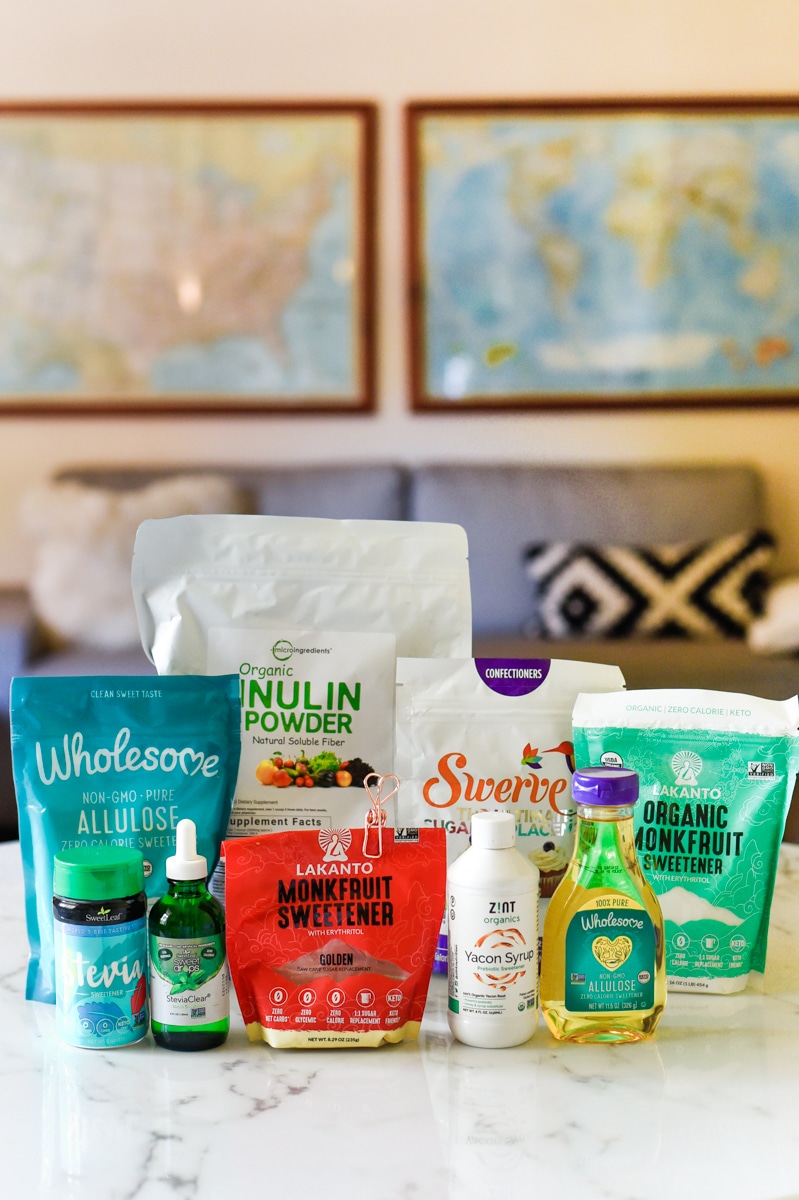Are you trying to quit sugar, but you love a sweet treat? Don’t worry; there are plenty of natural alternatives to sugar that, consumed in moderation, are healthy and safe.
It’s been six years since I quit sugar, and I’ve created hundreds of sugar-free recipes that are delicious and satisfying, with no added sugar and minimal use of natural sweeteners.
Whether you are looking to lose weight or improve your overall health, read on to discover some of the best sugar substitutes and how to work with them to achieve your health goals.
How many types of sugar alternatives are there, and are they safe?
There are three types of sugar alternatives:
Artificial sweeteners
Artificial sweeteners, such as aspartame, saccharin, and sucralose, are often used as a non-caloric substitute for sugar in foods and drinks. Food manufacturers love them because they are cheap and have a long shelf life.
While they may provide a calorie-free alternative to sugar, research has linked their consumption to various negative health effects.
Some studies suggest that artificial sweeteners can increase the risk of metabolic disorders like obesity and diabetes, while others have linked them to an increased risk of certain types of cancer. Additionally, some people may experience negative side effects like headaches or digestive issues when consuming artificial sweeteners.
You might know them by these names: Sweet’N’Low, Equal, and Splenda.
A Duke University study in 2007 showed that one packet of Splenda, which is sucralose, killed off 50% of the male rat’s microbiome (good gut bacteria).
Caloric natural sweeteners
These are sugar substitutes from natural sources like maple syrup, agave syrup or agave nectar, molasses, and date syrup. In small quantities, they can be ok, but they do have a high glycemic index (especially agave syrup) and will raise your blood sugar.
Don’t get fooled by the label ‘natural’. High-fructose corn syrup is a natural sweetener, yet it is horrible for your health.
Coconut sugar is often used as a ‘healthier’ alternative to sugar, but it is nearly identical to cane sugar.
These sweeteners are often used in processed foods under the disguise of a ‘sugar-free’ label.
Of all the the natural sweeteners above, I prefer using a small amount of dates and rarely a small amount of maple syrup.
Non-caloric natural sweeteners
These are the sweeteners we focus on in this article: allulose, erythritol and xylitol, inulin, monk fruit, stevia, bocha sweet, and yacon syrup. These sweeteners can be safe if used in moderation.
They are great sugar alternatives for people with diabetes, or those on low-carb and sugar-free diets.
Read on to find out more about each type of non-caloric natural sweetener.

How to use non-caloric natural sweeteners
I’ve been using these sweeteners for more than six years, making hundreds of sugar-free desserts.
Many people complain about the after-taste and digestive symptoms after consuming some of these natural sweeteners, but I think that is because of how they are used.
To avoid the after-taste, and digestive symptoms and make sure they are safe, I follow these rules:
- Consume in moderation. Just because you can add one teaspoon of monk fruit to your coffee or tea, doesn’t mean you should. Use natural sweeteners only when there is no other way (like making desserts), and learn how to cut back on sweet beverages.
- Use a minimal amount of sweetener in a recipe. If you are trying to convert a traditional recipe to a sugar-free version, don’t just replace one cup of sugar with one cup of sweetener, even if on the package is mentioned that it is a 1:1 sugar replacement. I only use a few tablespoons in my recipes, and in some, none.
- Diversification. Experiment with more types of non-caloric sweeteners and diversify, so you don’t eat too much of just one type.
- Work on increasing your sensitivity to the sweet taste. This way, you’ll be able to enjoy desserts that are just slightly sweet.
Read more about my 5-Year Journey of Quitting Sugar and How It Changed My Life:
Seven sugar-free, low-calorie, natural sweeteners that are safe

Sugar-free, non-caloric, natural sweeteners are a great alternative to sugar and artificial sweeteners, even if you have insulin resistance, prediabetes, or diabetes. In fact, many doctors around the world recommend these sweeteners to people suffering from diabetes because they can offer you that sweet taste without spiking your blood sugar.
These seven natural sweeteners are considered safe:
- Allulose (non-GMO)
- Monk Fruit
- Inulin
- Erythritol (Swerve brand as favorite as it also contains prebiotic oligosaccharides)
- Stevia
- Yacon Syrup
- BochaSweet
While there are already studies confirming that these sweeteners are generally safe, long-term safety and effectiveness still need to be studied.
Allulose (non-GMO)
Allulose, quite a recent addition to many experts’ favorite list of non-caloric natural sweeteners, is a rare form of sugar that was first discovered in figs.
Allulose is so new that it is not yet approved by the European Union (at the time I’m writing this article, September 2022), but there are signs this will happen soon.
It is, however, approved by the FDA (Food and Drug Administration) in the US market. We soon should be seeing more sugar-free products – food and drinks – on the market containing allulose as a form of sweetener.
Allulose is almost 70% as sweet as sugar, so a little less sweet than sugar. Today, a lot of allulose is being produced, most of which comes from corn. For this reason, make sure you buy non-GMO allulose.
Allulose can be found in powder, granulated form, or syrup form and works well in baking and making ice cream or drizzling on top of pancakes and porridge.
Because allulose contains fiber, some people might experience minor, non-toxic abdominal discomfort when consuming it.
As with all non-caloric, natural sweeteners, make sure you consume them in moderation, or rather small quantities, that would be enough to satisfy your sweet tooth without unpleasant side effects.
- Wholesome Sweeteners Allulose Zero Calorie Granulated Sweetener, No Glycemic Impact, Non GMO, Gluten Free & Vegan, 12 oz (Pack of 1)
- Wholesome Sweeteners Allulose Syrup, Zero Calorie Liquid Sweetener, No Glycemic Impact, Non-GMO, Keto Friendly, 11.5 Oz
Gundry MD Allulose Sweetener
Gundry MD Allulose Sweetener (made with non-GMO corn) has the taste and texture of sugar yet contains zero calories and zero net carbs.
This gut-friendly sweetener is perfect for satisfying your sweet tooth without sabotaging your health. It’s great for baking, cooking, and adding to your favorite drinks.
Buy Gundry MD Allulose Sweetener here and save up to $78.00.

Monk fruit
What is monk fruit? Also called lo han guo or Buddha fruit, monk fruit is a small round green melon coming from southern China and named after the monks who first cultivated it centuries ago.
Its health benefits are well-known in traditional Chinese medicine, but The Food and Drug Administration (FDA) approved its use as a sweetener only in 2010. Like allulose, when I wrote this article, monk fruit is still to be approved by the European Union.
Monk fruit sweetener is extracted from dried fruit, and it is 150-250 times sweeter than table sugar. It has zero calories and carbs and does not raise blood glucose levels, hence is recommended for diabetics.
You can sweeten anything with monk fruit. In its granulated form, you can add it to cakes, desserts, coffee, teas, porridge, and pies, and in its liquid form, you can use it as a syrup for pancakes, crepes, and more. Monk fruit is one of my favorite sweeteners, and I missed it since I moved from the US to Europe.
The FDA concluded that monk fruit is “generally recognized as safe” for everyone, including pregnant women and children. However, there are no scientific studies yet on the long-term use effects. There are no known side effects.
Monk fruit has been traditionally used for thousands of years by the Chinese to make hot drinks for the treatment of sore throat and the removal of phlegm, and its anti-inflammatory properties have been confirmed in a 2011 study.
Because monk fruit is so sweet, most monk fruit sweeteners are mixed with erythritol.
- Lakanto Organic Classic Monk Fruit Sweetener with Erythritol – White Sugar Substitute, Zero Calorie, Keto Diet Friendly, Zero Net Carbs, Baking, Sugar Replacement (Organic Classic White – 1 lb)
- Monk Fruit Sugar Substitute Keto Friendly Non-Glycemic Zero Calorie Golden Sweetener in 16 Oz pack 1:1 Ratio for Sugar Substitute Tastes just like Sugar
- Lakanto Sugar Free Maple Syrup – Monk Fruit Sweetener, Keto Diet Friendly, Vegan, 1g Net Carbs, Pancakes, Waffles, Oatmeal, Coffee, Tea, Granola, Frosting, Marinade, Dressing (13 Fl Oz – Pack of 1)
Inulin
What is Inulin? Inulin is a type of dietary fiber found in more than 36.000 species of plants, such as chicory root, Jerusalem artichoke, garlic, raw asparagus, raw onion pulp, wheat, and raw barley.
Inulin is available as powder, in supplement form, or as an ingredient in high protein bars, cereal bars, yogurts, other milk products, drinks, baked goods, and desserts.
According to Dr. Steven Gundry, inulin “is probably the best prebiotic there is“.
Inulin helps improve digestive health and immunity, relieves constipation, helps manage high blood sugar, improves calcium and magnesium absorption and bone density, and, of course, helps with weight loss.
Also, although the evidence is not so strong, some studies talked about other benefits of inulin for heart health, colon cancer, mineral absorption, and inflammatory bowel disease.
In small doses, inulin is safe for most people. However, if you are sensitive to FODMAPs, you might not tolerate inulin. Always start with small amounts and see how you feel. Because of the high amount of fiber, you might experience digestive discomfort until your body adjusts to the added fiber.
Since inulin comes in a powder form, I love to add it to recipes that need a powder sweetener and to use it for dusting. Inulin is one of my favorites, but it is not a strong sweetener. It’s perfect for people like me who have trained their taste buds to be very sensitive to the sweet taste.
Erythritol
What is erythritol? Erythritol occurs naturally in some fruits, mushrooms, and fermented foods and belongs to the sugar-alcohols category (same as xylitol). The problem with sugar-alcohols is that they can cause digestive upset for some people. Erythritol is a good substitute if you can tolerate it.
In my experience, people use too much of it when trying to replace sugar. For example, if they have a recipe that asks for one cup of sugar, they’ll replace it with one cup of erythritol. I would never do that, and I don’t think that’s a SAFE way to use sweeteners.
The most I ever added to a dessert was maybe 1/4 cup of sweetener, but I generally add 1, 2, or 3 tablespoons. When used this way, it will most likely not cause side effects.
Due to its low-calorie content and no impact on blood glucose levels, erythritol is recommended by doctors for people with diabetes.
NOTE: Does erythritol cause cardiovascular disease?
In March 2023, a study about erythritol published in Nature made misleading headlines about the safety of this sweetener in relation with cardiovascular health. While I do agree that we need to be more cautious when using these sweeteners and use them minimally, the study was misinterpreted by most of the media outlets and created panic among those who have been using this natural sweetener.
This new study only proves that high levels of erythritol in the blood are associated with adverse effects of cardiovascular disease. However, erythritol can actually be created endogenously from glucose by an unhealthy metabolism (the people in the study were over 60 and already had heart disease). The level of erythritol in the plasma is actually not related to the consumption of the sweetener erythritol.
Also, correlation does not equal causation, and several studies have shown that erythritol is not only safe, but has several benefits – including positive effects associated with reducing cardiovascular disease.
Stevia
What is Stevia? Stevia is a very old natural sweetener used to add sweetness to tea, and other beverages taste since the 16th century. The plant, part of the sunflower family, is originally from Paraguay and Brazil, but nowadays, it is also found in Japan and China (China is now the current leading exporter of stevia).
Stevia is a non-nutritive sweetener (it contains zero calories) and a herbal supplement. It tastes 200 to 300 times sweeter than table sugar, and it’s FDA and EU-approved alternative sweetener.
If monk fruit is popular in the US, Erythritol and stevia are the most common non-caloric sweeteners in the European Union.
The most common way Stevia is sold is in a liquid form, in a very small bottle. Use one or a very few drops in your coffee or desserts where a granulated sweetener is not necessary. In a granulated form, stevia is usually mixed with erythritol or other sugar-alcohols.
The problem with stevia is the aftertaste, usually described as bitter. I have never experienced this problem; I guess this is because I always use the minimum for just a hint of sweetness. Also, the quality of the stevia product you are buying matters, and a more expensive product, from a reputable company will be of better quality.
Some popular brands of Stevia, like Sweet Leaf in the US, are mixed with inulin.
- SweetLeaf Natural Stevia Sweetener Powder Shaker, 4 Ounce
- SweetLeaf Sweet Drops Liquid Stevia Sweetener, SteviaClear, 4 Fl Oz (Pack of 2)
Yacon Syrup
What is Yacon Syrup? Yacon Syrup is a natural sweetener extracted from the yacon root, which natively grows in the Andes mountains in South America, where it has been traditionally used for medicinal purposes.
People there believed that Yacon Syrup’s properties benefited those suffering from diabetes and helped in kidney affections and digestive disorders.
The syrup has a dark color, and its consistency is similar to molasses.
The carbohydrate content in yacon is about 70 to 80 % fructooligosaccharides and inulin. These components have a low glycemic index and should not cause spikes in blood sugar. According to Nutrition by WebMD, yacon root is shown to be hypoglycemic and may decrease insulin resistance and serum insulin.
However, use yacon syrup with caution if you have diabetes. In general, use Yacon syrup in small quantities occasionally. Dr. Steven Gundry states that he has observed a rise in triglyceride levels in some people consuming yacon syrup.
I used to be a big fan of Yacon syrup at the beginning of my journey, but now I enjoy it only occasionally, with some pancakes.
BochaSweet
BochaSweet is a zero-calorie, low-glycemic sweetener made from the kabocha pumpkin. It is a natural alternative to sugar that can be used in baking and cooking, as well as in beverages.
BochaSweet is known for its ability to mimic the taste and texture of sugar without the negative effects on blood sugar levels or dental health. It is also considered a safe option for those with diabetes and those following a ketogenic or low-carb diet.
The structure of the kabocha pumpkin extract is 100% pentose (5-carbon) derived from kabocha in the molecular structure of xylitol. While some BochaSweet products are pure kabocha extract, some are mixed with erythritol. Read the label to understand what kind of sweetener you are buying.
- BochaSweet (16 oz): The Supreme Sugar Replacement (pure kabocha extract)
- BochaSweet Brown Sugar Replacement – Golden Erythritol Derived from Kabocha and Natural Fruits + Monk Fruit Extract – 1:1 Sugar Substitute, Zero Calorie, Keto Friendly, Zero Glycemic, Non-GMO, Zero Net Carb, 16 oz
Conclusion on natural sweeteners
In conclusion, if you’re looking for a way to add some sweetness to your diet without consuming too many calories or sugar, there are plenty of natural options available.
From stevia to monk fruit to allulose, there are several low-calorie, sugar-free sweeteners that can be used as a substitute for traditional sugar in a variety of recipes.
When incorporating these natural sweeteners into your diet, it’s important to be mindful of portion sizes and not rely on them too heavily. As with anything, moderation is key. By using these natural sweeteners in moderation and in combination with other healthy eating habits, you can enjoy a sweet treat without compromising your health goals.
Overall, by opting for natural sweeteners instead of processed sugar, you can improve your health and well-being in a delicious and satisfying way. So, go ahead and experiment with different natural sweeteners to find your perfect fit and enjoy the benefits of a healthier, low-calorie, sugar-free lifestyle.

Start cooking
There are hundreds of sugar-free recipes on this website, as well as in my two cookbooks.
You can start by browsing the HEALTHY SWEET TREATS category or use the search bar to look for a healthier version of your favorite sweet treat.
Check out our recipe round-up of sugar-free desserts that are also gluten-free and lectin-free: 30+ Healthy Sugar-Free Dessert Recipes.

*This page contains affiliated links, which means I get a small commission if you choose to purchase something via one of my links, at no extra cost to you.

6 Comments
Meredith Garner
July 9, 2024 at 4:59 pmSo helpful! I always come to you when I have questions. Thank you, Claudia!
Claudia
July 10, 2024 at 7:28 amHi Meredith! So happy this was helpful. It’s such a controversial topic at the moment. With love, Claudia
cyberdoc
June 12, 2024 at 2:51 pmHi Claudia
You mention the misinterpreted study about erythritol and you may have some point, but how about these studies about xylitol which is much more ubiquitous in the the food industry and you do not mention?
-European Heart Journal: “Xylitol is prothrombotic and associated with cardiovascular risk.”
-Cleveland Clinic: “Cleveland Clinic-Led Study Links Sugar Substitute to Increased Risk of Heart Attack and Stroke.”
-Calorie Control Council: “CCC Statement in Response to Xylitol is Prothrombotic and Associated with Cardiovascular Risk.”
these sugars although they are natural, but their blood levels can be very high due to increased absorption way above the absorption of glucose.
Claudia
June 12, 2024 at 4:12 pmHi! Thank you for your comment. The study you mentioned is relatively new, and I haven’t seen much discussion about it yet. Since it’s so recent, I prefer to let the information settle before making a comment. However, I should note that xylitol is just a side note in my list. I’ve used it perhaps once or twice in the past seven years, and I rarely buy processed foods.
I genuinely believe that we should not overuse any sweeteners. I’ve emphasized this multiple times in this article and on other occasions. If you look at my recipes, you’ll notice they contain minimal amounts of artificial sweeteners (around 2-4 tablespoons for a 10-serving cake, sometimes none!). My concern lies with those who consume excessive amounts of these sweeteners, as it defeats the purpose of re-educating our palates to reduce cravings for sweetness. When our brains detect a sweet taste, they can’t distinguish it from sugar.
There’s a lot of nuance to this topic that I can’t fully cover in a comment, but I hope this answers your question.
Best,
Claudia
cyberdoc
June 13, 2024 at 3:07 amThank you Claudia for the prompt reply, and again I am quite happy that you exert some caution in using artificial sweeteners even though they may be marketed as natural. The main problem with those is that we don’t know how the body handles them, and as was shown in the study I mentioned, the blood level was not commensurate with the amount ingested, because it seems to bypass the normal absorption pathways for glucose, and achieve higher levels in the blood. So while 2-4 tbsp may not be much, how much of it gets absorbed remains to be studied. I believe those studies will unfold soon enough, uncovering many previously unpublished information that was conveniently tucked away by marketing companies.
Regards
Claudia
June 13, 2024 at 3:46 amThanks for bringing it up. Will keep an eye on this landscape in the next few months. At this stage I think there is a study out about all of them – except maybe allulose. Let’s see. Until then, maybe we should all eat less sweet things. xx -Claudia